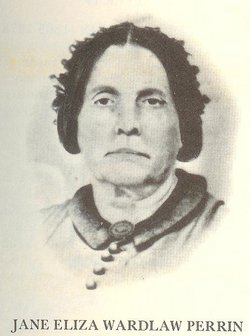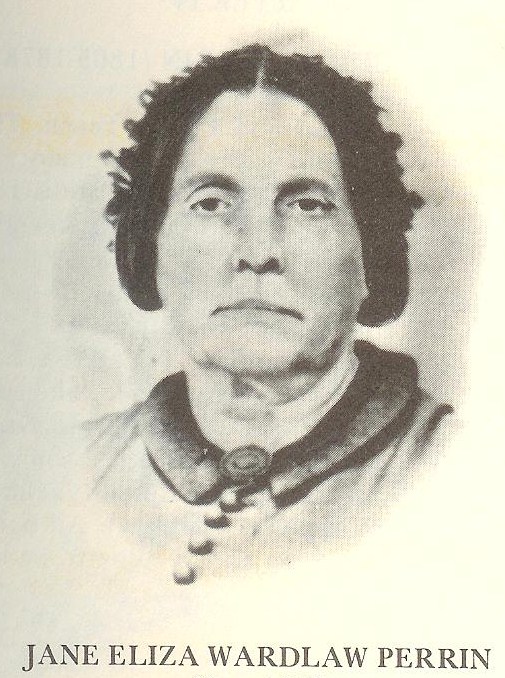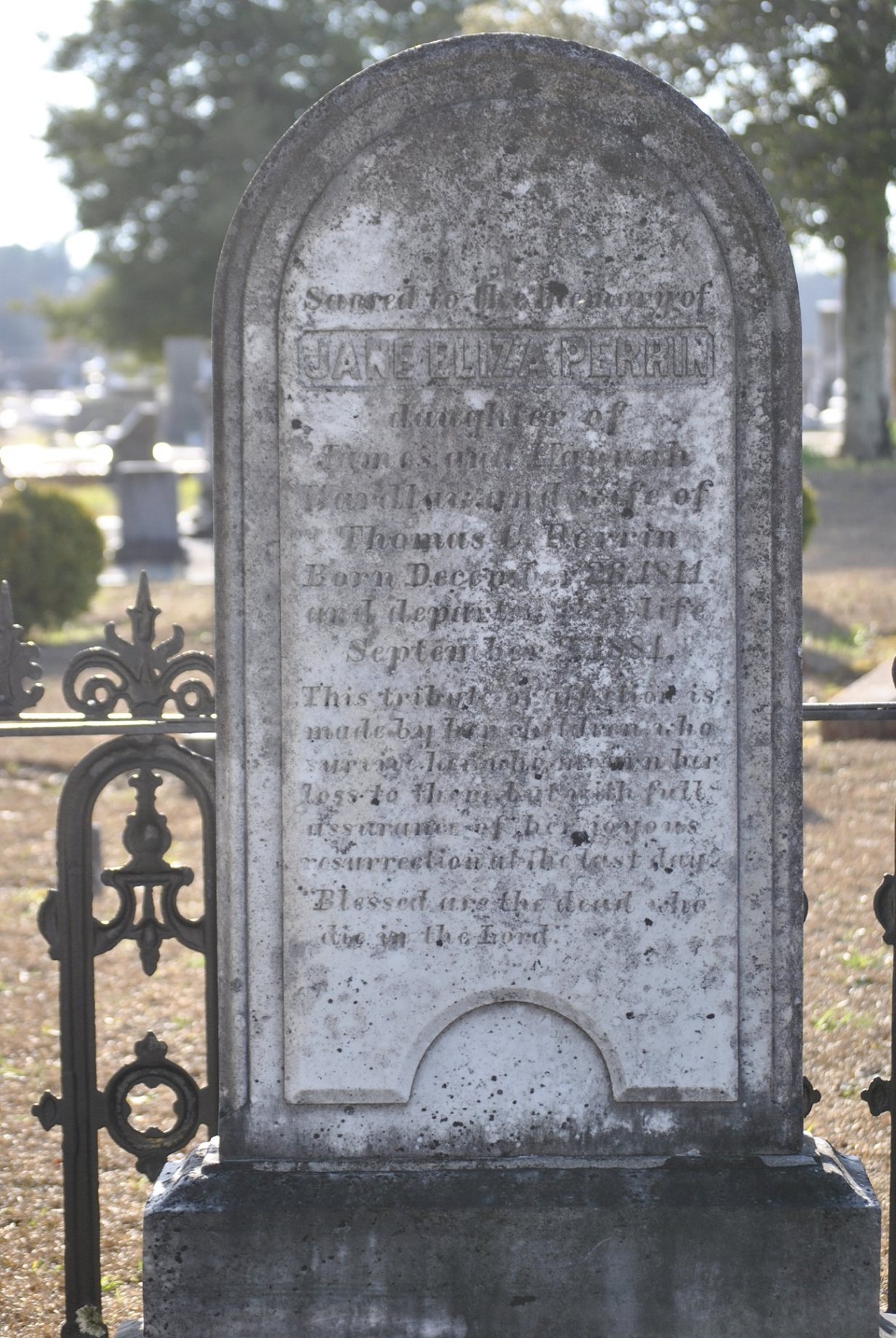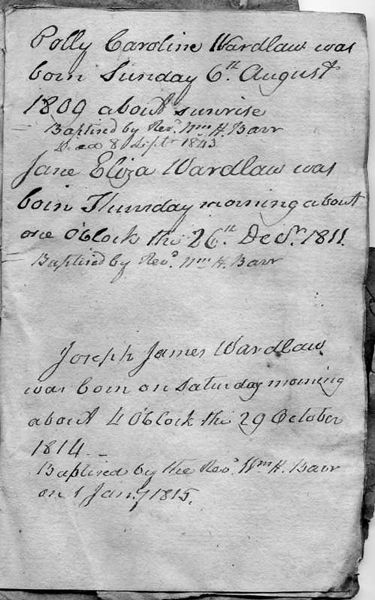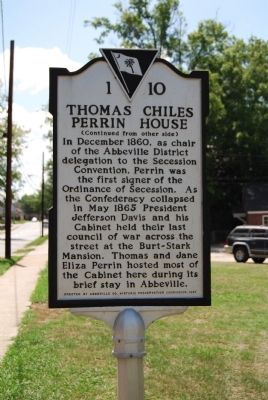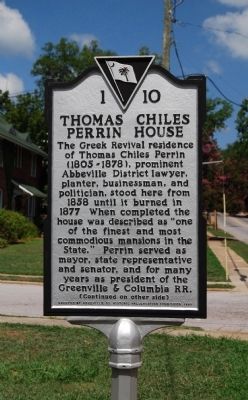She received the education appropriate for the daughter of a prosperous Southern family of the time, attending private school at at the academy of S.W. Doggett in Abbeville, at Dr. Johnson's in Greenville in 1825, and at Dr. Elias Marks' in Columbia in 1826.
Jane married Thomas Chiles Perrin, her father's law partner, on 19 January 1830, at the Quay House. They moved into a home in Abbeville Village where all twelve of their children were born. Thomas also owned a 1200 acre plantation about fifteen miles south of Abbeville, called Cotton Level. The family visited the plantation for social occasions, but the daily operation was in the hands of an overseer.
In 1856 Thomas Perrin began the construction of his magnificent Abbeville mansion. Two years in the building and furnishing, in 1858 Jane became mistress of the finest house in Abbeville. The Abbeville Press described the home as "one of the finest and most commodious mansions in the State, and truly an ornament to our village........it extends 76 feet in the front and 85 in the rear, and is 54 feet in height; it contains 28 rooms in all, and has 19 fireplaces."
When the house burned in 1877, the newspaper reported: "Above the finely finished basement of brick and stone were two stories of wood, the top being surmounted by an ornamental cupola or observatory. There were seven large rooms on each of the three floors, divided by elegant halls and joined by portentous folding doors, in each of which rooms might have been found an abundance of expensive marble, as well as walnut and mahogany woods. The plastering was one of the most elaborate and the finest cast while the frescoing and stuckoing would have adorned the royal palace of an Eastern prince. Each of the halls and rooms were lighted by magnificent gas chandeliers. A thorough system of water works pervaded the whole house, and every other conceivable comfort or luxury the modern improvements in modern mansion architecture had suggested up to that time was included.
In the burning of this building we have lost a structure the like of which will never again be erected in Abbeville."
To select the furnishings suitable for their new home, in October 1858, the Perrins traveled to New York City, where Jane had a magnificent shopping tour buying velvet and tapestry carpeting, satin and damask drapes, linens, silver, china, crystal, and mahogany and rosewood furniture. (Perrin papers at the Manuscripts Dept. of the Library of North Carolina at Chapel Hill include notes and receipts from this trip.)
Yet the war years soon came, and Jane Eliza Perrin, like many Southern women, suffered great losses--personal, financial, a way of life. The Perrins buried two sons: William Henry Perrin, killed at Gaines Mill in 1862, and Thomas Samuel Perrin, killed at Chancellorsville in 1863. Col. James Perrin, Thomas Perrin's younger brother also died at Chancellorsville. Innumerable nephews, cousins, and friends died of injury or disease, or came home wounded in body or spirit. Jane Eliza Perrin was instrumental in forming a group of Abbeville women to open a hospital at the Abbeville Hotel, where ill and injured soldiers could be cared for as they passed through Abbeville. Her daughters held knitting groups, and braided palmetto fronds to form hats for the soldiers.
The post-war years were little better. The Perrins had lost a great deal of their wealth, and their uninsured mansion burned in 1877, causing a move to a smaller house in the village. Thomas C. Perrin, her husband of 48 years, died suddenly in 1878. In 1879, Jane Eliza, newly widowed and in her late sixties, made the Perrin house home to two of her grandchildren, fifteen year old Francis Harrison, Jr. and twelve year old Jane Wardlaw Harrison, children of her deceased daughter, Mary Eunice Perrin Harrison. In 1880 she was living with her daughter and son-in-law, Emma and James S. Cothran.
Her health was failing, and her son, James Wardlaw mentioned his concern in a note to cousin Wade Cothran on 8 March 1881: "Mother has been very ill today, had another attack of apoplexy at 8 this morning, has been unconscious most of the day. She was sleeping quietly a few minutes ago when I left her. We are very uneasy about her"
Only six of her twelve children survived her, plus the niece she had raised from infancy, Janie Eliza Thomson Perrin, daughter of her husband's youngest brother, James.
Her obituary in the Abbeville Press on 14 September 1881 contained the following tribute to Jane Eliza Wardlaw Perrin:
"Mrs. Perrin's noble qualities and beauties of character shone most in her magnificent home, where surrounded with all the luxuries that wealth could bestow and with a large and devoted family around her, she discharged to the uttermost the duties of a Christian mother and wife, and was a humble follower of that Savior, whose teachings she delighted in and whose service was her chief pleasure. She was one of a generation of old men and women whose lives form the history of Abbeville--a generation that is fast disappearing and whose places it will be hard to fill."
Judge Joseph D. Wardlaw recalled his aunt as "short and stout in person, kind and given to hospitality, and greatly loved and respected by her kindred and friends."
Written by Mary Lou Perrin Bailey, a great-great granddaughter.
She received the education appropriate for the daughter of a prosperous Southern family of the time, attending private school at at the academy of S.W. Doggett in Abbeville, at Dr. Johnson's in Greenville in 1825, and at Dr. Elias Marks' in Columbia in 1826.
Jane married Thomas Chiles Perrin, her father's law partner, on 19 January 1830, at the Quay House. They moved into a home in Abbeville Village where all twelve of their children were born. Thomas also owned a 1200 acre plantation about fifteen miles south of Abbeville, called Cotton Level. The family visited the plantation for social occasions, but the daily operation was in the hands of an overseer.
In 1856 Thomas Perrin began the construction of his magnificent Abbeville mansion. Two years in the building and furnishing, in 1858 Jane became mistress of the finest house in Abbeville. The Abbeville Press described the home as "one of the finest and most commodious mansions in the State, and truly an ornament to our village........it extends 76 feet in the front and 85 in the rear, and is 54 feet in height; it contains 28 rooms in all, and has 19 fireplaces."
When the house burned in 1877, the newspaper reported: "Above the finely finished basement of brick and stone were two stories of wood, the top being surmounted by an ornamental cupola or observatory. There were seven large rooms on each of the three floors, divided by elegant halls and joined by portentous folding doors, in each of which rooms might have been found an abundance of expensive marble, as well as walnut and mahogany woods. The plastering was one of the most elaborate and the finest cast while the frescoing and stuckoing would have adorned the royal palace of an Eastern prince. Each of the halls and rooms were lighted by magnificent gas chandeliers. A thorough system of water works pervaded the whole house, and every other conceivable comfort or luxury the modern improvements in modern mansion architecture had suggested up to that time was included.
In the burning of this building we have lost a structure the like of which will never again be erected in Abbeville."
To select the furnishings suitable for their new home, in October 1858, the Perrins traveled to New York City, where Jane had a magnificent shopping tour buying velvet and tapestry carpeting, satin and damask drapes, linens, silver, china, crystal, and mahogany and rosewood furniture. (Perrin papers at the Manuscripts Dept. of the Library of North Carolina at Chapel Hill include notes and receipts from this trip.)
Yet the war years soon came, and Jane Eliza Perrin, like many Southern women, suffered great losses--personal, financial, a way of life. The Perrins buried two sons: William Henry Perrin, killed at Gaines Mill in 1862, and Thomas Samuel Perrin, killed at Chancellorsville in 1863. Col. James Perrin, Thomas Perrin's younger brother also died at Chancellorsville. Innumerable nephews, cousins, and friends died of injury or disease, or came home wounded in body or spirit. Jane Eliza Perrin was instrumental in forming a group of Abbeville women to open a hospital at the Abbeville Hotel, where ill and injured soldiers could be cared for as they passed through Abbeville. Her daughters held knitting groups, and braided palmetto fronds to form hats for the soldiers.
The post-war years were little better. The Perrins had lost a great deal of their wealth, and their uninsured mansion burned in 1877, causing a move to a smaller house in the village. Thomas C. Perrin, her husband of 48 years, died suddenly in 1878. In 1879, Jane Eliza, newly widowed and in her late sixties, made the Perrin house home to two of her grandchildren, fifteen year old Francis Harrison, Jr. and twelve year old Jane Wardlaw Harrison, children of her deceased daughter, Mary Eunice Perrin Harrison. In 1880 she was living with her daughter and son-in-law, Emma and James S. Cothran.
Her health was failing, and her son, James Wardlaw mentioned his concern in a note to cousin Wade Cothran on 8 March 1881: "Mother has been very ill today, had another attack of apoplexy at 8 this morning, has been unconscious most of the day. She was sleeping quietly a few minutes ago when I left her. We are very uneasy about her"
Only six of her twelve children survived her, plus the niece she had raised from infancy, Janie Eliza Thomson Perrin, daughter of her husband's youngest brother, James.
Her obituary in the Abbeville Press on 14 September 1881 contained the following tribute to Jane Eliza Wardlaw Perrin:
"Mrs. Perrin's noble qualities and beauties of character shone most in her magnificent home, where surrounded with all the luxuries that wealth could bestow and with a large and devoted family around her, she discharged to the uttermost the duties of a Christian mother and wife, and was a humble follower of that Savior, whose teachings she delighted in and whose service was her chief pleasure. She was one of a generation of old men and women whose lives form the history of Abbeville--a generation that is fast disappearing and whose places it will be hard to fill."
Judge Joseph D. Wardlaw recalled his aunt as "short and stout in person, kind and given to hospitality, and greatly loved and respected by her kindred and friends."
Written by Mary Lou Perrin Bailey, a great-great granddaughter.
Inscription
Jane Eliza Perrin
daughter of James and Hannah Wardlaw
and wife of Thomas C. Perrin
born December 26, 1811
and departed this life September 9, 1881
This tribute of affection is made by
her children who survive her who mourn
her loss to them but with full assurance
of her joyous resurrection at the last day.
Blessed are the dead who die in the Lord.
Family Members
-
![]()
Elizabeth Alice Wardlaw
1797–1804
-
![]()
David Lewis Wardlaw
1799–1873
-
![]()
Judge Francis Hugh Wardlaw
1800–1861
-
![]()
James Harper Wardlaw
1802–1807
-
![]()
Elizabeth Amanda Wardlaw Ramsey
1805–1854
-
![]()
Robert Henry Wardlaw Sr
1807–1887
-
![]()
Mary Caroline Wardlaw
1809–1843
-
![]()
Joseph James Wardlaw
1814–1873
-
![]()
William Alfred Wardlaw
1816–1876
-
![]()
Ann Louisa Wardlaw
1819–1821
-
![]()
Hannah Margaret Wardlaw Patterson
1821–1879
-
![]()
Amanda Elizabeth Perrin
1830–1831
-
![]()
Mary Eunice Perrin Harrison
1832–1874
-
![]()
James Wardlaw Perrin
1833–1890
-
![]()
Emma Chiles Perrin Cothran
1834–1916
-
![]()
Hannah Clarke Perrin
1836–1918
-
![]()
William Henry Perrin
1838–1862
-
![]()
Lewis Wardlaw Perrin
1839–1907
-
![]()
Sarah Eliza "Sallie" Perrin White
1841–1925
-
![]()
Thomas Samuel Perrin
1845–1863
-
![]()
Francis Hugh Perrin
1846–1854
-
![]()
George Clopton Perrin Sr
1850–1912
-
![]()
Robert Coalter Perrin
1852–1853
Advertisement
Records on Ancestry
Advertisement
